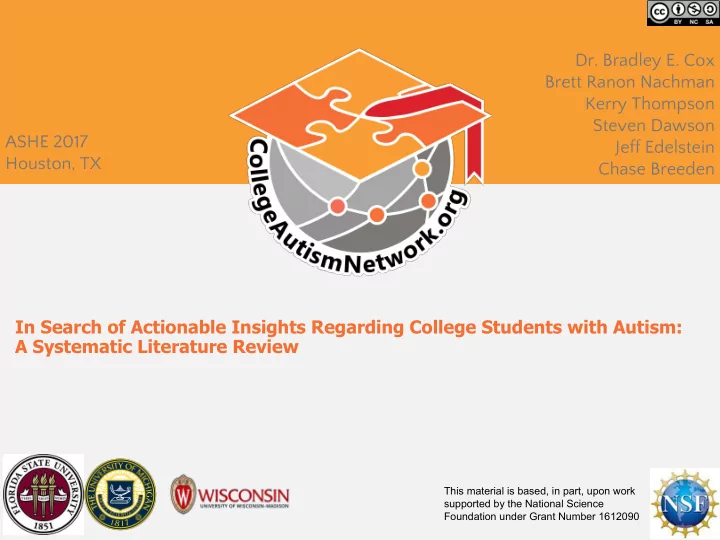

Dr. Bradley E. Cox Brett Ranon Nachman Kerry Thompson Steven Dawson ASHE 2017 Jeff Edelstein Houston, TX Chase Breeden In Search of Actionable Insights Regarding College Students with Autism: A Systematic Literature Review This material is based, in part, upon work supported by the National Science www.CollegeAutismNetwork.org Foundation under Grant Number 1612090
Our Team Kerry Thompson Brett Ranon Nachman Jeff Edelstein Steven Dawson Dr. Bradley E. Cox Chase Breeden Associate Professor of M.A. Higher Education Ph.D. Student, Education M.A. Student, Higher Ph.D. Candidate, Undergraduate Research Educational Community Director Leadership and Policy Education: Rehabilitation Psychology Assistant Leadership and Policy North Carolina State Analysis Institutional Research Studies University Florida State University Florida State University University of University of Michigan University of Wisconsin-Madison - Ann Arbor Wisconsin-Madison www.CollegeAutismNetwork.org
Challenges 1 Individual ● Social, Communication, Transition Institution 2 ● Academic, Independent Living ● Lack of data, “someone else’s problem” ● Inefficient coordination across units 3 System ● IDEA vs ADA legal foundation ● Minimal transition planning in 4 Society K-12 . ● Misunderstandings; pop-culture assumptions ● Stigmatization; low expectations www.CollegeAutismNetwork.org
Methods Literature Journal identification Article Filtering Categorization Supplementary* Annotation Interdisciplinary Faculty 13,000 Articles 57 Articles 36 Articles 7 Additional Articles Team 1/2000 - 9/2015 Annotated in Framework of ● ● ● ● Counterbalance ● Education PRISMA teams of two or Actionable limitations of initial ● Communication ● Keywords more Insights review ● Medicine ● “auti*”, “ASD”, ○ Undergradua ● Two authors ● Only included in 16 Journals Identified “Asperger” te Third author ○ discussion ● “higher ○ Graduate in case of education" ● 21 removed disputes ● “Colleg*” ○ No mention ● One primary “ postsecondary ” of college or theme ● 94 Abstracts students ● One or more ● 37 removed with autism secondary themes www.CollegeAutismNetwork.org
Framework How are they doing in Who are these students? college? Where is there room for What’s happening while improvement? they’re in college? What might we do differently? Are existing efforts effective? What theories shape our interpretation of this What matters for this population? population’s experiences? www.CollegeAutismNetwork.org
PRIMARY THEMES SECONDARY THEMES Results : Distribution Across Framework www.CollegeAutismNetwork.org
Distribution Across Methods Notable Trends: ● First-world nations ● Small sample size ● Limited data from students w/ autism themselves www.CollegeAutismNetwork.org
Distribution Across Journals 3 15 3 2 1 12 www.CollegeAutismNetwork.org
Synthesis of Substantive Content • Turbulent transitions from high school to college • Parental dependence • Lack of self-advocacy • Stress • Stigmatization • Lack of institutional change to serve students with autism • Infrequent discussion groups, conversations, workshops • Deficit of engaging with students with autism www.CollegeAutismNetwork.org
Holes, Bias, and Imbalance Imbalance Holes 1 generating theory 11 Insight TOTAL Insight 14 Action “evaluating” “interventions” www.CollegeAutismNetwork.org
Holes, Bias, and Imbalance Imbalance Holes (Q1) Prevalence (Q2) Experiences & Outcomes www.CollegeAutismNetwork.org
Implications for Practice ● Personalized Transition Planning and Programs ○ College recruitment and admissions ○ Orientation, FYE/transition coursework ● Technological Tools ○ To support communication, self-care, organization ○ To provide virtual tours, trainings, and video modeling ● Personal Social Support ○ Professional staff as social coaches or facilitating discussion groups ○ Student peer mentors as supportive guide to engaging with the campus community www.CollegeAutismNetwork.org
Implications for Research We can’t wait... It’s time to... • ...for national statistics or large-scale quant • ...conduct studies that examine experiences of surveys to offer updated information college students with autism • ... for educational leaders to find current • ...publish in higher ed journals literature • ...draw from theories associated with other • ...for the development of a consensus marginalized populations and creatively adapt theory to guide our work them to study students with autism • ...for students with autism to self-advocate • ...actively include students with autism in studies www.CollegeAutismNetwork.org
Conclusions Students with autism are already at our colleges, so we must glean insight from them to inform appropriate actions. "they" have now become part of "us"... therefore, WE can't wait . www.CollegeAutismNetwork.org
Developing Insight, Taking Action From Pena, From Pena, 2014 2014 Cox, B. E., Thompson, K., Anderson, A., Mintz, A., Locks, T. Morgan, L., Edelstein, J., & Wolz, A (2017, 58.1, pp. 71-87 ). College experiences for students with Autism Spectrum Disorder (ASD): Personal identity, public disclosure, and institutional support. Journal of College Student Development. www.CollegeAutismNetwork.org
Moving Forward Autism-Related Characteristics in College STEM Students: Prevalence, Performance, and Mediation (1) determine the prevalence of autism-related characteristics among college students entering STEM fields; (2) assess the effect of autism-related characteristics on student performance in gateway STEM courses; (3) evaluate the effect of formal disability accommodations on the classroom performance of STEM students with autism-related characteristics. A Spectrum of Student Success www.CollegeAutismNetwork.org
College Autism Network Advocacy Research Training We would like to thank the faculty members who helped us identify the 16 journals, and additional students who helped us annotate articles therein. Full Paper, slides, and additional resources available at www.CollegeAutismNetwork.org Dr. Bradley E. Cox www.CollegeAutismNetwork.org brad@collegeautismnetwork.org
Recommend
More recommend